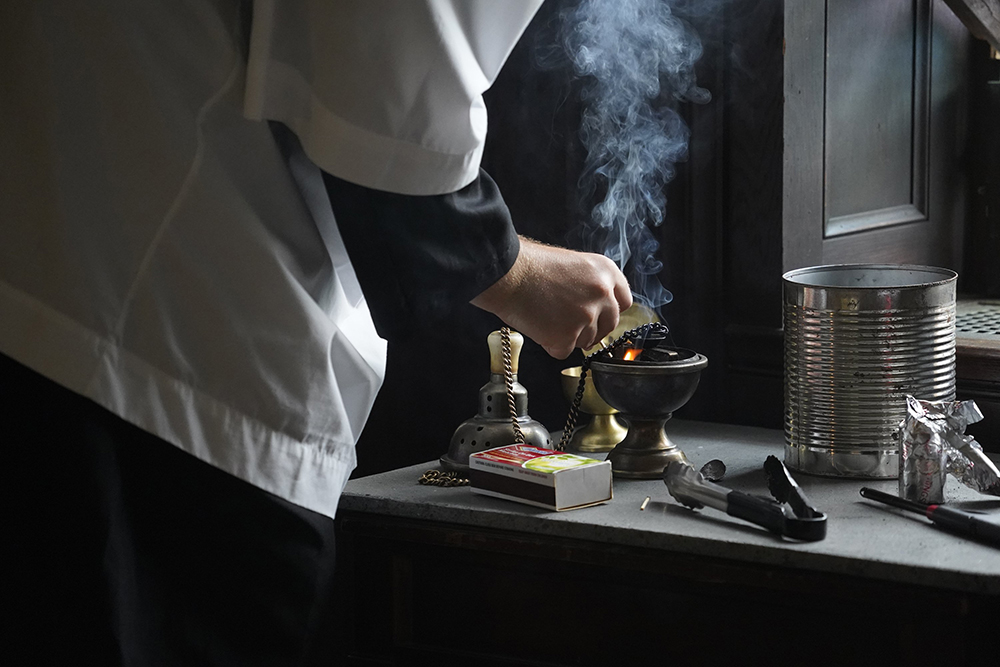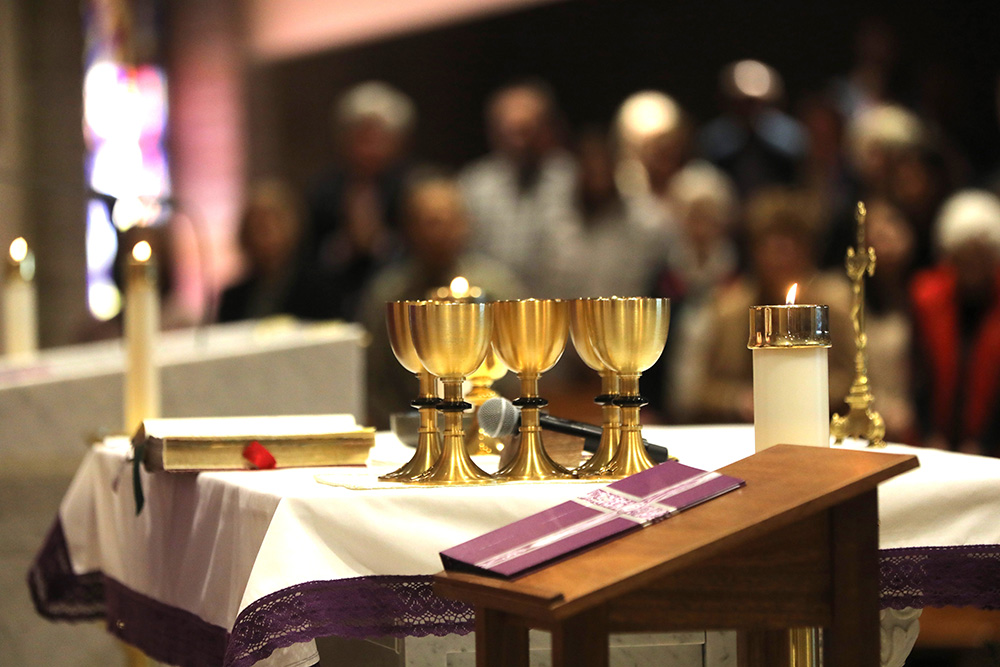
Altar server Bradley Morley prepares a censer for use during a traditional Latin Mass July 1, 2021, at Immaculate Conception Seminary in Huntington, New York. (CNS/Gregory A. Shemitz)
The year is 1962 and a tall, drowsy boy opens the front door of his family's crowded two-flat to the gray darkness of near dawn. The sidewalk along Leamington Avenue is empty as he heads the half block south to the church. The Chicago neighborhood of cops, mechanics, firemen, cemetery workers, city workers, truck drivers and janitors is asleep. It's a quarter to six.
The church is filled with a darkness that would be oppressive except that the sanctuary lights, turned on for this early weekday Mass, provide a welcoming warmth. In the back and near the side altars, banks of candles flicker.
The boy goes to the door to the left of the altar and enters the sacristy. He selects a long, black cassock and works his way down the dozen or so buttons. Over this, he puts a plain white cotton surplice and walks down the corridor to the priest's side of the sacristy. He fills one cruet with water and the other with wine, its over-ripe smell always a curiosity for him.
Advertisement
As the Mass starts, Fr. Fitzpatrick places the green-draped chalice on the altar and returns to the foot of the stairs where the boy is kneeling. The priest, in his forest green vestment, turns to the altar, bows and, making the sign of the cross, begins. "In nomine Patris, et Filii, et Spiritus Sancti. Amen. Introibo ad altare Dei."
The boy, bent double, his head down nearly to the step in front of him, responds from memory in a rush: "Ad Deum qui laetificat juventutem meam." ("A dayum qweelay teefeecot yooven tootem mayum.")
Later, at the consecration, Fr. Fitzpatrick prays over the round, thin wafer of tasteless, paper-like bread, whispering the words of consecration with a dry, urgent exactitude. Then, as the priest raises the newly consecrated host, the boy presses a small keyboard on the step above him, creating five round, deep tones that reverberate through the silence and stillness of the church, all the way back to the vestibule.
There is something perfect for the boy at this moment.
He is kneeling in the midst of beauty, from the delicately colored terra cotta saints, angels and symbols set in the marble of the altar to the deep, rich, dark wood backdrop topped by even more saints, from the intricately worked lace altar linens to the gold thread and bright color of Fr. Fitzpatrick's vestments. He is astonished at being so close to the wonder-filled richness of the altar, at being so near to the host, at being a part of this central ritual of his community. Like Peter, he feels the wish to set up tents and live here forever.

Communion chalices for reception of holy Communion by the faithful rest on the altar during Mass at Sacred Heart Church in Prescott, Arizona, Dec. 10, 2023. (OSV News/Bob Roller)
Now, more than 60 years later, a tall, overweight man in his mid-70s walks up to the altar at Sunday Mass to give the first reading from the book of Exodus and then returns to his pew on the far left side of the congregation. Something in the moment gets him thinking about the wonder he felt as an altar boy.
He saw the altar then as the focus of faith. Now, six decades later, he sees the Mass in an even wider context.
He has come to understand that faith is lived in the world amid the billions of other humans, or it's not lived at all. Faith is a living thing, he's learned. It's not locked away, like a security bond, but shared in the rough and tumble of life.
And this rough-and-tumble life — a life of love and risk — is at the heart of the message Jesus brought. Jesus didn't celebrate the Last Supper and then remain in the upper room. He went out to play his role in the drama of existence.
Having faith, the old man in the side pew has come to learn, is about being open to the fullness of life. He has learned this especially from his wife, and from their two children, both now adults with kids of their own.
The altar is not a jeweled treasure, nor is it a hideaway. It is deeply a part of the world — like the airport, the grocery store, the house next door.
Jesus didn't celebrate the Last Supper and then remain in the upper room. He went out to play his role in the drama of existence.
What happens in this place is not purer than what happens elsewhere in life. It shares the messiness that is life. It can be boring, yes, as an airplane ride can be boring. But it can be transcendent, too, as in the moment when you look out your window and watch a half dozen sparrows chitter around the bread crumbs left on the sidewalk.
And it is something that is done in and with the community. Back six decades ago, the boy felt that he and Fr. Fitzpatrick were in a bubble of holiness. Now the old man in the side pew knows that he shares this moment with all the other people in the pews, some of whom are his friends, others unknown to him.
The altar, in fact, extends out the full length of the church, and all of those present are taking part in the consecration of the host — and the consecration of their lives.
Even more, the altar extends beyond this building, beyond this city, to encompass the entire world. That is where the old man in the pew lives and where everyone else in the congregation lives. That is where the fullness of faith takes place.
At the store, in traffic, online, on a walk, in a crowd — in every interaction in life — this is where, like Jesus, the old man and everyone else gathered around this altar will play their role in the drama of existence. Holiness isn't a bubble; it's a smile.







